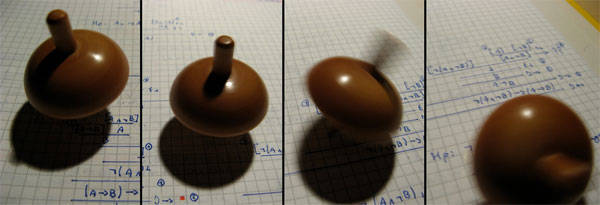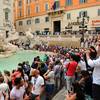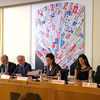Italian News Spinning
... Three cases last week showed that the Italians spin no less skillfully than anyone else—but that unspinning is extremely difficult.
The troublesome Case Number One reflects two contradictory facts. In the past three years the presence of Romanians in Italy has tripled, and today over one million Romanians, including Romanian Roma, or Gypsies, live in Italy. Only 400,000 have legal status, hard to obtain partly because bureaucrats and police are simply overwhelmed. Since last summer, a number of widely publicized murders and other serious crimes involving Romanians and Roma have taken place, and Romanians now top the lists of perpetrators of serious crimes, including manslaughter and rape, committed in Italy by foreigners.
The result is panic and anti-Romanian, anti-immigrant resentment, even though Romanian crime seems to have increased in proportion to the augmented presence of Romanians. Indeed, official statistics show that, while financial crimes and robberies of households in Italy are on the rise, crimes of violence are actually on the wane. If so, then the citizens’ perception that they are under particular threat from the Romanian nationals would be disproportionate to the reality.
In November the Romanetwork accused both politicians and the media for conducting a “sustained campaign…of inciting panic over crimes purportedly committed by Romanians—and in particular by Romanian Roma. The Italian government has also passed an emergency decree facilitating the expulsion of Romanian citizens, with only limited procedural protection. In the context of agitating for these draconian new measures, the media in both Italy and Romania have participated in explicitly racist incitement, and a number of high-ranking officials have made explicitly anti-Romani statements.”
In an evident, if ill considered, attempt at fairness, last week the distinguished president of the Institutional Affairs Commission of the Chamber of Deputies, the former magistrate Luciano Violante, summoned the directors of TV news operations (Berlusconi’s, the independent La 7 and the state-owned RAI), for a three-hour meeting basically asking the media not to fan the flames of prejudice and make the public feel needlessly insecure.
It didn’t take. The network directors were having no part in political doctoring of the news: “To summon us here to tell us that the news is contributing to making citizens feel insecure would lower us in the ranks of press freedom,” retorted Clemente Mimun, news director of Berlusconi’s Tg5. The (presumably) more progressive head of RAI’s Tg3 Antonio Di Bella was no less resentful: “The last thing I’d like is to be called in again to be told, a year from now, that crime is on the rise but that public perceptions of it have decreased.” A Northern League spokesman, Roberto Cota, called the intervention “just one more attempt to politicize information.” At the same time the moderate president of the Order of Journalists in Lazio, Bruno Tucci, also blew the whistle, saying that Violante’s were Fascist-style Minculpop tactics: “What does he [Violante] want—for us to ignore reality and sugar-coat sensitive issues that everyone can see? To have journalists not do their job for the sake of the establishment?”
Case number two was more cut and dried. As the Great Garbage Implosion continued to fill the pages with horrific photos, and the public piazzas with angry mobs, the press could hardly remain on the sidelines. Sardinia has an active recycling program which has produced enviable results, but when Renato Soru, president of the Sardinian Region, offered the island’s modern facilities to the Neapolitans for incineration, a local right-wing newspaper together with a radio station in Cagliari published the “fact” that 36,000 tons of rubbish would be dumped on the island from Naples. The news resulted in a mob scuffle at the port, even though—according to Soru—the real figure was a small percentage of what the newspaper had published: 6,000 tons, or 1.5% of Sardinia’s recycled waste. Accusing the newspaper and radio of fomenting violence through its inaccurate statistics, Soru announced he will sue for defamation.
The third case of spin gone wrong began with the former primate president of the Italian bishops’ conference, the CEI, and present vicar for the diocese of Rome, Camillo Cardinal Ruini, who compiled a thick file on Rome’s presumed state of degrado, or degradation. This file went to Pope Benedict XVI, who received Rome Mayor Walter Veltroni last week, and rapped the Rome mayor over the head with it.
The result was enormous resentment of Church interference, and not only from the press; Romans were complaining, not for the first time, that the Vatican does not pay taxes on income-generating property it owns and manages in Rome outside Vatican walls. The leftist press had a field day attacking both pope and mayor: “A donkey being lashed – Veltroni came out of the meeting with Benedict XVI with his bones broken,” said Il Manifesto, only slightly more outraged than the rest of the Italian press.
Veltroni fired back with statistics showing that his administration had doubled services for the elderly and the poor. Reacting to the uproar, the cardinal who is the pontiff’s deputy in the Vatican, Tarcisio Bertone, backtracked on papal behalf, explaining that it had all been a misunderstanding. After this clarification, Veltroni thanked the pope, adding piously that the Rome administration had been working to “improve the quality of life without losing sight of the needs and rights of the weakest and the most disadvantaged.” Point counter-point—just another faux pas on the road to Roman coexistence.





































i-Italy
Facebook
Google+
This work may not be reproduced, in whole or in part, without prior written permission.
Questo lavoro non può essere riprodotto, in tutto o in parte, senza permesso scritto.